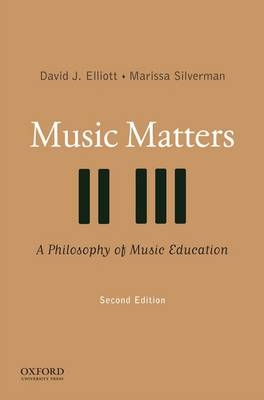
Music Matters: A Philosophy of Music Education
Oxford University Press Inc (Verlag)
978-0-19-533404-3 (ISBN)
perception, and personhood weave through the book's proposals. Practical principles for curriculum and instruction emerge from the authors' praxial themes.
David J. Elliott is Professor of Music and Music Education at New York University. An internationally sought-after author and speaker, Dr. Elliott is also an award-winning jazz composer/arranger. Marissa Silverman is Associate Professor of Music Education at the John J. Cali School of Music at Montclair State University. A Fulbright scholar and professional flutist in New York City, her publications include discussions of urban music education, musical interpretation, and ethics and social justice.
Part I. Foundational Matters 1. Introduction 1. Some Serious Matters2. Preliminary observations3. Aims4. Premises5. Three Key Concepts: very Brief introductions6. Reading this Book7. Special Features8. End of the Beginning2. Philosophy and Music Education 1. Philosophy: A Brief Introduction2. The Philosophy of Music Education: A Very Brief Introduction3. Philosophy and Advocacy: What's the Difference?4. Praxis, Praxial, and Related Concepts5. Conclusion3. Music 1. First Thoughts2. Limitations3. Plan of the Chapter4. Stage One: First Steps to a Concept of Music5. Stage Two: Basic Conclusions and Working Concepts6. Music: Two Broad Categories7. On the Origins and Evolution of Musics8. Stage Three9. Stage Four: Music as a Social Praxis10. Conclusion4. Education 1. Plan of the Chapter2. Limitations3. Stage One: Why think About Education?4. Stage Two: First steps to a Concept of Education5. Stage Three: Historical Perspectives6. Stage Four: Education as a Social Praxis7. Conclusion5. Personhood 1. Aims and Limitations2. Plan of the Chapter3. Basic Concepts and Terms4. A Holistic Concept of Persons and Personhood5. Matty and Maureen6. Consciousness7. Persons as Embodied and Enactive8. Brain9. The Brain: Perfect or Not?10. Is There a Musical Brain Center?11. Mind12. Body Mapping and Mirror Neurons13. Emotions and Feelings14. Implications for Music EducationPart II. Musical Processes and Products in Contexts 6. Musical Understanding 1. Musical Understanding? Common Answers and Serious Omissions2. Aims and Limitations3. Plan of the Chapter4. A Praxial Concept of Musical Understanding: Embodied and Enactive5. Musical Understanding = Musicianship + Listenership6. Procedural/Action Musical Thinking and Knowing7. Verbal Musical Thinking and Knowing8. Experiential Musical Thinking and Knowing9. Situated Musical Thinking and Knowing10. Intuitive Musical Thinking and Knowing11. Appreciative Thinking and Knowing12. Ethical Musical Thinking and Knowing13. Supervisory Musical Thinking and Knowing14. Musical Understanding (Revisited)15. Implications for Music Education7. Musicing and Listening in Contexts 1. Aims and Limitations2. Performing in Context3. Musical Interpretation4. Expanding on Musical Interpretation5. Composing in Context6. Improvising in Context7. Arranging in Context8. Music Listening in Context9. Further Examples of Cultural-Ideological Influences10. Love, Hate, and Other Musical Matters11. Music as Culture12. Ethics of Musicing and Listening in Context13. Artistic Citizenship in Context14. Implications for Music Education8. Musical Products in Contexts 1. Aims and Limitations2. Plan of the Chapter3. "Products?"4. Musical Form-Content Relationships5. Performance-Interpretation Dimensions6. Musical Design7. Praxis-Specific Style Characteristics8. Musical Expression9. Musical Representations10. Cultural-Ideological Dimensions11. Narrative Dimensions12. Autobiographical Dimensions13. Ethical Dimensions14. Implications for Music Education9. Musical-Emotional Experiences 1. First thoughts2. Aims and Limitations3. Plan of the Chapter4. Theories of Musical Experience5. Psychological Perspectives on Musical Experience6. A Concept of Musical-Emotional Experiences7. Implications for Music Education10. Musical Creativity in Contexts 1. Aims and Limitations2. Plan of the Chapter3. The Concept of Creativity4. Etymology and a Brief History of Creativity5. Originality and Significance6. Spontaneous Originality7. Creative Personality and Creative Process (Creative Thinking)8. Foundations of Creative Achievement9. Creativity and Imagination10. Creativity in Review11. Music "Good and Great"12. Implications for Music Education11. Musical Values 1. Aims and Limitations2. Plan of the Chapter3. Self and Identities4. Human Tendencies and Human Interests5. Consciousness Revisited6. Self-Growth7. Conditions of Self-Growth and Enjoyment8. Characteristics and Consequences of Self-Growth9. Self-Esteem and Personhood10. Safety, Self-Esteem, and Personhood11. Human Tendencies and Human Interests Revisited12. The Values of Music Making13. The Values of Music Listening14. Musical-Emotional Experiences and Social Capital15. Implications for Music EducationPart III. Music and-as-in Education 12. Music Education and Curriculum 1. Aims and Limitations2. Plan of the Chapter3. The Concept of Curriculum4. Conventional Curriculum-Making5. Against Conventional Curriculum-Making6. Teachers and Curriculum-Making7. An Alternative Concept of Curriculum-Making8. Curriculum Commonplaces9. Music Curriculum-Making10. Four stages of Curriculum-Making11. A Praxial Music Curriculum12. Stage One: A Praxial Orientation13. Music Teaching and Learning 1. Aims and Limitations2. Plan of the Chapter3. The Reflective Musical Practicum4. Preparing and Planning the Practicum5. Music Teaching and Learning6. A Praxial View of Curriculum Evaluation7. The Inclusive Music Curriculum14. Music Education and Schooling 1. Aims and Limitations2. Plan of the Chapter3. Education vs. Schooling4. The Functions of Schooling5. The Principles of Schooling6. The Corollaries of Schooling7. A Fundamental Problem8. Toward the Future: The Short-Run9. Toward the Future: The Long-Run10. Toward the Future: The Professional Music Educator and CM Facilitator
| Erscheint lt. Verlag | 23.6.2014 |
|---|---|
| Verlagsort | New York |
| Sprache | englisch |
| Gewicht | 740 g |
| Themenwelt | Kunst / Musik / Theater ► Musik ► Musiktheorie / Musiklehre |
| Sozialwissenschaften ► Pädagogik ► Allgemeines / Lexika | |
| Sozialwissenschaften ► Pädagogik ► Bildungstheorie | |
| ISBN-10 | 0-19-533404-3 / 0195334043 |
| ISBN-13 | 978-0-19-533404-3 / 9780195334043 |
| Zustand | Neuware |
| Haben Sie eine Frage zum Produkt? |
aus dem Bereich


